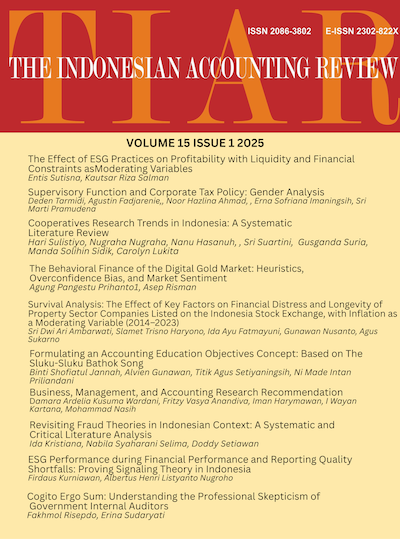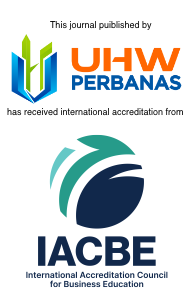Supervisory Function and Corporate Tax Policy: Gender Analysis
DOI:
https://doi.org/10.14414/tiar.v15i1.4759Keywords:
Audit Committee, Corporate Tax Policy, Gender, Independent CommissionersAbstract
This study analyses the role of independent commissioners and audit committees in carrying out their supervisory functions on corporate tax policies taken by internal management, gender analysis on independent commissioners and audit committees is unique to this study where different behaviors of men and women have different impacts on independent commissioners and audit committees in carrying out their supervisory functions. A total of 570-panel data from 2015 to 2021 financial statements of manufacturing companies on the Indonesia Stock Exchange were analyzed, this study found that multi-gender audit committees have a role in encouraging management to comply with tax regulations in the policies taken, as well as female audit committees and male independent commissioners separately. These results provide input for investors who are concerned about entity tax information to choose entities with criteria according to the findings of this study, namely entities that have multi-gender audit committees, entities that have female audit committees only, or entities that have independent commissioners only because the supervisory function carried out is optimal in encouraging tax-compliant entities and entities avoid the risk of tax penalties in the future.
References
Alhadi, S. A., Senik, R., Johari, J., Said, R. M., & Nahar, H. S. (2021). Multiple directorships and earnings quality: Does investor protection matter? Journal of Asia Business Studies, 15(4), 605–624. https://doi.org/10.1108/JABS-08-2019-0254
Alhady, I., Arieftiara, D., & Lastiningsih, N. (2021). Does board of commissioners independence still relevant in tax avoidance monitoring? International Journal of Research in Business and Social Science (2147- 4478), 10(5), 148–156. https://doi.org/10.20525/ijrbs.v10i5.1263
Amin, A., Djuminah, Surhadjanto, D., & Agustiningsih, S. W. (2017). Board-Auditor Interaction and Earnings Management : The Model of Company with Concentrated Ownership. Review of Integrative Business and Economics Research, 6(3), 217–238. https://sibresearch.org/uploads/3/4/0/9/34097180/riber_6-3_a17-208_217-238.pdf
Boussaidi, A., & Hamed-sidhom, M. (2021). Board ’ s characteristics , ownership ’ s nature and corporate tax aggressiveness : new evidence from the Tunisian context. EuroMed Journal of Business, 16(4), 487–511. https://doi.org/10.1108/EMJB-04-2020-0030
Coate, C. J., & Frey, K. J. (2000). Some Evidence On The Ethical Disposition Of Accounting Students: Context And Gender Implications. Teaching Business Ethics, 4(June), 379–404.
Dakhli, A. (2022). Do women on corporate boardrooms have an impact on tax avoidance ? The mediating role of corporate social responsibility. Corporate Governance, 22(4), 821–845. https://doi.org/10.1108/CG-07-2021-0265/full/html
Daniel NA, M., Ridwansyah, E., & Makhsun, A. (2022). The effect of institutional ownership, independent commissioners, and fiscal loss compensation on tax avoidance in manufacturing companies on the IDX. Jurnal Ilmiah ESAI, 16(2), 130–141. https://jurnal.polinela.ac.id/ESAI
Darma, Y. A., & Astuti, S. (2021). Pemahaman Konsep Literasi Gender (Fisrt Ed.). Langgam Pustaka.
Deslandes, M., Fortin, A., & Landry, S. (2020). Audit committee characteristics and tax aggressiveness. Managerial Auditing Journal, 35(2), 272–293. https://doi.org/10.1108/MAJ-12-2018-2109
Devos, K. (2012). The impact of tax professionals upon the compliance behavior of Australian individual taxpayers. Revenue Law Journal, 22(1). https://doi.org/10.53300/001c.6730
Dhamara, G. P., & Violita, E. S. (2018). The Influence of Financial Distress and Independence of Board of Commissioners on Tax Aggressiveness. Advances in Economics, Business and Management Research (AEBMR), 55(2018), 81–86. https://doi.org/10.2991/iac-17.2018.15
Dowling, J., & Pfeffer, J. (1975). Pacific Sociological Association Organizational Legitimacy: Social Values and Organizational Behavior. Source: The Pacific Sociological Review, 18(1), 122–136.
Fitria, G. N., & Handayani, R. (2019). Tax Avoidance: Studi Empiris Pada Perusahaanmanufaktur Sektor Barang Konsumsi Di Indonesia. Monex : Journal Research Accounting Politeknik Tegal, 8(1), 251. https://doi.org/10.30591/monex.v8i1.1263
Friscilla, Y., & Nugroho, P. I. (2020). Love of Money, Machiavellian dan Persepsi Etis: Analisis Berdasarkan Perspektif Gender. Jurnal Akuntansi Profesi, 11(2), 223–234. https://doi.org/https://doi.org/10.23887/jap.v11i2.29928
García-Sánchez, I.-M., Martínez-Ferrero, J., & García-Meca, E. (2017). Gender diversity, financial expertise and its effects on accounting quality. Management Decision, 55(2), 347–382. https://doi.org/https://doi.org/10.1108/MD-02-2016-0090
Ghozali, I., & Ratmono, D. (2017). Analisis Multivariat Dan Ekonometrika : Teori, Konsep, Dan Aplikasi Dengan Eview 10 (1st ed.). Badan Penerbit Universitas Diponegoro. http://inlislite.perpusnas.go.id
Gujarati, D. N., & Porter, D. C. (2012). Basic Econometrics. Salemba Empat.
Hamdan, A. (2020). The role of the audit committee in improving earnings quality: The case of industrial companies in GCC. Journal of International Studies, 13(2), 127–138. https://doi.org/10.14254/2071-8330.2020/13-2/9
Handayani, T., & Sugiarti, S. (2017). Konsep dan Teknik Penelitian Gender (4th Ed.). Penerbit Universitas Muhammadiyah Malang.
Handriani, E. (2020). Earning management and the effect characteristics of audit committee, independent commissioners: Evidence from Indonesia. Research in World Economy, 11(3), 108–123. https://doi.org/10.5430/rwe.v11n3p108
Hoseini, M., Gerayli, M. S., & Valiyan, H. (2019). Demographic characteristics of the board of directors ’ structure and tax avoidance Evidence from Tehran Stock Exchange. International Journal of Social Economics, 46(2), 199–212. https://doi.org/10.1108/IJSE-11-2017-0507
Iazzi, A., Vacca, A., Maizza, A., & Schiavone, F. (2023). The role of corporate board and auditors in tax planning : evidence from Italy. Management Research Review, 46(3), 321–339. https://doi.org/10.1108/MRR-07-2021-0518/full/html
Jamei, R. (2017). International Journal of Economics and Financial Issues Tax Avoidance and Corporate Governance Mechanisms: Evidence from Tehran Stock Exchange. International Journal of Economics and Financial Issues, 7(4), 638–644. http:www.econjournals.com
Jensen, M. C., & Meckling, W. H. (1976). Theory of the Firm: Managerial behavior, Agency Cost and Ownership Sturcture. Journal of Financial Economics, 3(1976), 305–360. https://doi.org/10.1177/0018726718812602
Kawedar, W., Rizkyana, F. W., & Handayani1, R. S. (2021). The Influence of Audit Committee Characteristics And External Auditors On Earnings Quality (Study On Sharia Banks In Southeast Asia). Jurnal Akuntansi, 9(1), 74–85. https://doi.org/10.26460/ja.v9i1.2387
Khlif, H., & Achek, I. (2017). Gender in accounting research : a review. Managerial Auditing Journal, 32(6), 627–655. https://doi.org/10.1108/MAJ-02-2016-1319
Khosheghbal, M., Amiri, A., & Homayoon, A. (2017). International Journal of Economics and Financial Issues Role of Audit Committees and Board of Directors in Reducing Earning Management of Companies Listed in Tehran Stock Exchange. International Journal of Economics and Financial Issues, 7(6), 147–153. http:www.econjournals.com
Kuncoro, M. (2013). Metode riset untuk bisnis dan ekonomi bagaimana meneliti dan menulis tesis? (W. Hardani (ed.); Ed. 4). Erlangga.
Lunenburg, F. C. (2012). Compliance Theory and Organizational Effectiveness. International Journal of Scholarly Academic Intellectual Diversity, 14(1), 1–4. http://nationalforum.com/Electronic Journal Volumes/Lunenburg, Fred C Compliance Theory and Organizational Effectivenes IJSAID V14 N1 2012.pdf
Marlinah, A., Susanto, Y. K., & Theodora, P. (2022). Corporate Governance and Earnings Quality: An Empirical in Indonesia. Academy of Accounting and Financial Studies Journal, 26(3), 1–8. https://doi.org/10.4108/eai.26-3-2019.2290923
Mclaughlin, C., Armstrong, S., Moustafa, M. W., & Elamer, A. A. (2021). Audit committee diversity and corporate scandals : evidence from the UK. International Journal of Accounting & Information Management, 29(5), 734–763. https://doi.org/10.1108/IJAIM-01-2021-0024/full/html
Nuroniyah, S. F., & Basuki. (2020). Independent Commissioner Role in Earnings Management and Investment Efficiency Relationship. Journal of Security and Sustainability Issues, 10(Oct), 472–483. https://doi.org/10.9770/jssi.2020.10.Oct(38)
Oussii, A. A., & Klibi, M. F. (2019). Does the chief audit executive gender matter to internal audit effectiveness ? Evidence from Tunisia. Africal Journal of Economic and Management Studies, 10(4), 424–439. https://doi.org/10.1108/AJEMS-12-2018-0404
Pamungkas, J. F., & Fachrurrozie. (2021). The Effect of the Board of Commissioners, Audit Committee, Company Size on Tax Avoidance with Leverage as an Intervening Variable. Accounting Analysis Journal, 10(3), 173–182. https://doi.org/10.15294/aaj.v10i3.51438
Riguen, R., Salhi, B., & Jarboui, A. (2020). Do women in board represent less corporate tax avoidance ? A moderation analysis. International Journal of Sociology and Social Policy, 40(1/2), 114–132. https://doi.org/10.1108/IJSSP-10-2019-0211
Sakdiyah, R., & Setiyono, W. P. (2020). The Influence of Independent Commissioners, Audit Committees, Corporate Social Responsibility (CSR) on Tax Avoidance in Manufacturing Companies in the Goods and Consumption SubSector in 2016-2020. Academia Open, 7(2022), 1–15. https://doi.org/10.21070/acopen.7.2022.3424
Santoso, M. R., Maksum, A., & Bukit, R. B. (2022). Shareholders And Independent Commissioners In Influencing The Tax Planning Strategy. Webology, 19(2), 8115–8131.
Setiawan, F. A., Kurniawati, H., & Kristanto, S. B. (2020). The Influence of Women in the Board of Commissioners, CFO, and the Audit Committee on Earnings Quality. Jurnal Akuntansi, 24(2), 204. https://doi.org/10.24912/ja.v24i2.691
Setiawati, L., Icih, I., & Suangga, A. (2019). The Effect of Company Sizes, The Number of Board of Commissioners, Board of Directors Competence and Audit Committees on Tax Management. JABI (Journal of Accounting and Business Issues), 1(1), 22–33. https://ojs.stiesa.ac.id/index.php/jabi
Siagian, D., & Siregar, S. V. (2018). The Effect of Audit Committee Financial Expertise And Relative Status On Earnings Management: Case of Indonesia. Jurnal Akuntansi, 22(3), 321. https://doi.org/10.24912/ja.v22i3.391
Soetanto, T. V., & Fun, L. P. (2015). Super Slack-Based Model Efficiency and Stock Performance of Manufacturing Industry Listed in Indonesian Stock Exchange. Procedia - Social and Behavioral Sciences, 211, 1231–1239. https://doi.org/10.1016/j.sbspro.2015.11.164
Tarmidi, D., Alfia, Y. D., & Umar, H. (2022). Analyzing Owner’s Role in Influencing Corporate Tax Policy. Humanities and Social Sciences Letters, 10(4), 428–439. https://doi.org/10.18488/73.V10I4.3107
Yasser, Q. R., Mamun, A. Al, & Ahmed, I. (2016). Quality of financial reporting in the Asia-Pacific region: The influence of ownership composition. Review of International Business and Strategy, 26(4), 543–560. https://doi.org/10.1108/RIBS-02-2016-0011
Zirgulis, A., Huettinger, M., & Misiunas, D. (2022). No woman, no aggressive tax planning ? A study on CEO gender and effective tax rates in the Lithuanian retail sector. Review of Behavioral Finance, 14(3), 394–409. https://doi.org/10.1108/RBF-09-2020-0232/full/html
Downloads
Submitted
Published
How to Cite
Issue
Section
License
Copyright (c) 2025 The Indonesian Accounting Review

This work is licensed under a Creative Commons Attribution-NonCommercial 4.0 International License.

















